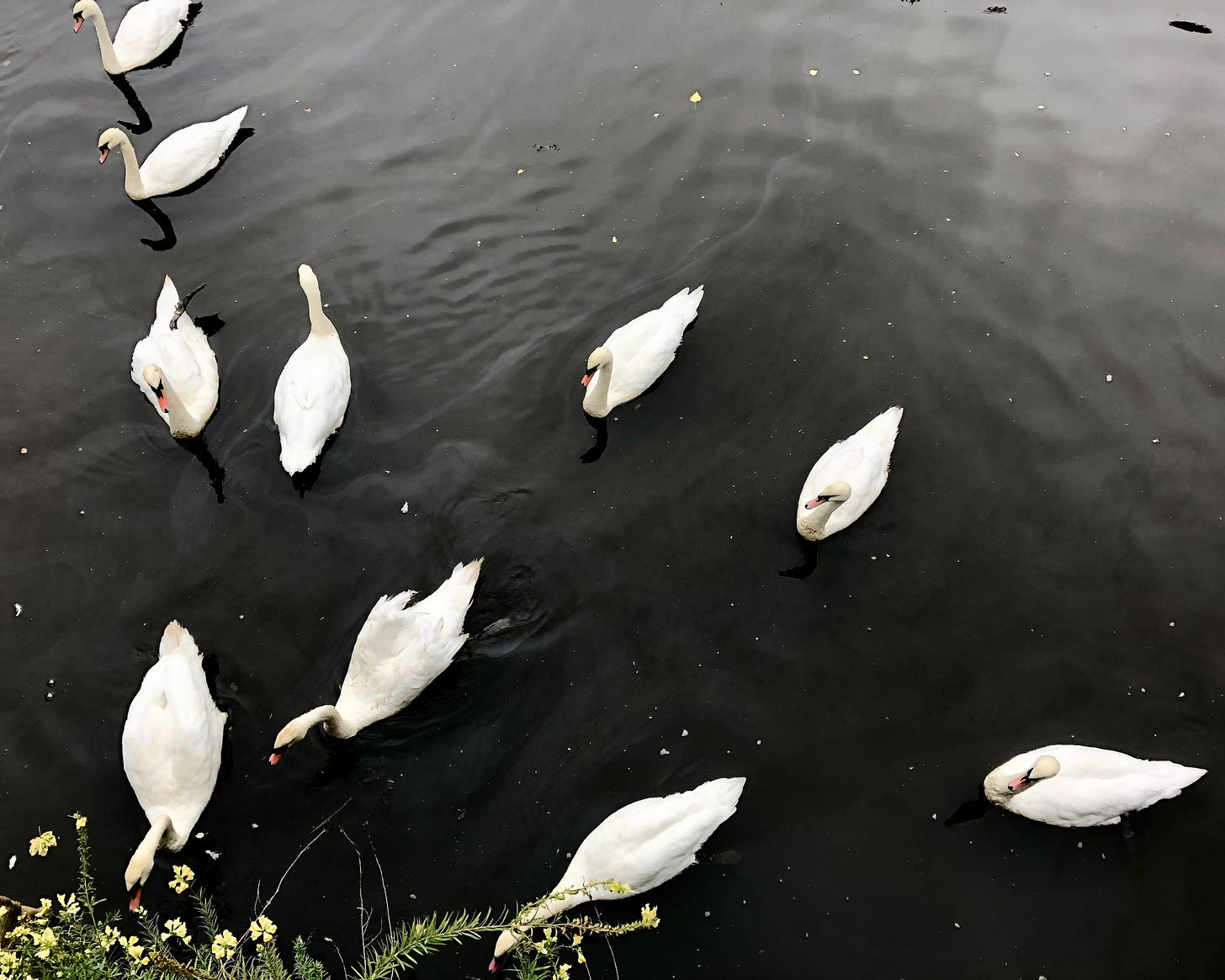This month marks a momentous seam in my family’s life. After five years of living, studying, and teaching in Durham, England (and beyond!), we are moving to Birmingham, Alabama where I’ll be taking up a post as Assistant Professor of Old Testament and Hebrew at Beeson Divinity School.
Alongside this move, I’m re-imagining this email newsletter.
Over the last five years I’ve tried to make SPLINTERED LIGHT into more than an update for our supporters. I’ve tried to make it something to look forward to, an informative, even formative, read in its own right.
Although we no longer have supporters, I plan to keep writing the newsletter with a new focus on serving ministry leaders (i.e., my students) past and present. Yet I hope that anyone who is interested in thinking about Scripture, life, and culture will find something to enjoy here.
SPLINTERED LIGHT is free for all readers—and I intend to keep it that way—but to make it worth my while, I rely entirely on the generosity of you, my patrons. If you have been supporting my work up to now, would you please continue to invest in my teaching and writing by taking out a paid subscription? More on this below…
What should I expect?
SPLINTERED LIGHT is a newsletter about culture, ministry, and life, my ongoing attempt to think out loud within the world of Scripture. It’s a little bit of everything I’m interested in with an eye toward serving my students present and past. If you’re interested in some of the things I’m interested in—on whatever level—I hope you’ll find something to enjoy. Basically, I’m going to write the kind of thing that I would enjoy reading, because, as C. S. Lewis once told J. R. R. Tolkien, “Tollers, there is too little of what we really like in stories. I am afraid we shall have to try and write some ourselves.”1
My main subject will be Scripture and its interpretation, especially the Old Testament, but I’ll also touch on life, ministry, and culture. You can expect a sort of working file of short articles on the Bible, ideas, insights, and connections as well as a good number of recommendations—what I’m reading, listening to, watching, enjoying—that kind of thing.
The plan is to put out two issues a month.
The first issue will be called The Litany. In The Litany, I’ll collect and share quotes, songs, articles, books, etc., as well as short ideas or reflections—connections sparked by things I’m thinking about. This will be my attempt to keep a sort of digital commonplace book. The Litany will come out on the second Friday of each month.
The other issue will be a short essay (a ten-minute read, give or take) that I hope will be both instructive and encouraging. Generally these will have to do with Scripture, but there may also be the occasional piece on subjects that range further afield (a book or movie review, a spiritual reflection, a cultural comment). These may be stand-alone essays on topics I’ve been thinking about, or they may arrange themselves into the occasional series, e.g., Old Testament Theology, or, How to Read and Understand Biblical Wisdom. These articles should go out on the last Friday of each month.
This is what I’m gonna shoot for, but I’m not obligating myself (that’s why it’s free). We’ll see how it goes.
Why is it called SPLINTERED LIGHT?
The title of the newsletter comes from a paradigm-shifting conversation that C. S. Lewis once had with J. R. R. Tolkien (and their friend and fellow Inkling, Hugo Dyson). On the night of September 19, 1931, Tolkien and Dyson went to visit Lewis in college at Magdalen. Dyson and Tolkien were committed Christians, but Lewis was still struggling with the significance of Christ’s death and resurrection. After dinner they went for a stroll around Addison’s Walk and their conversation turned to the meaning of “myth.”
But, said Lewis, myths are lies, even though lies breathed through silver.
No, said Tolkien, they are not.
And, indicating the great trees of Magdalen Grove as their branches bent in the wind, he struck out a different line of argument.
You call a tree a tree, he said, and you think nothing more of the word. But it was not a ‘tree’ until someone gave it that name. You call a star a star, and say it is just a ball of matter moving on a mathematical course. But that is merely how you see it. By so naming things and describing them you are only inventing your own terms about them. And just as speech is invention about objects and ideas, so myth is invention about truth.
We have come from God (continued Tolkien), and inevitably the myths woven by us, though they contain error, will also reflect a splintered fragment of the true light, the eternal truth that is with God. Indeed only by myth-making, only by becoming a ‘sub-creator’ and inventing stories, can Man aspire to the state of perfection that he knew before the Fall. Our myths may be misguided, but they steer however shakily towards the true harbour, while materialistic ‘progress’ leads only to a yawning abyss and the Iron Crown of the power of evil.
[…]
You mean, asked Lewis, that the story of Christ is simply a true myth, a myth that works on us in the same way as the others, but a myth that really happened? In that case, he said, I begin to understand.2
They reportedly talked on these things till 3AM, when Tolkien went home. Lewis and Dyson continued the conversation till daybreak. Twelve days later, Lewis wrote to a close friend, “I have just passed on from believing in God to definitely believing in Christ—in Christianity. […] My long night talk with Dyson and Tolkien had a great deal to do with it.”3
Perhaps cause I grew up on Lewis and Tolkien’s books, this conversation deeply resonated with me when I first discovered it over twenty years ago. For a long time now, I have taken the phrase “splintered light” as an evocative impression of the value to be gleaned from all human myths, that is, stories that express the longing in our hearts and give our world and our lives in our world meaning and significance. I would expand the idea even further to encompass all human artifacts that point to our creativity and longing. After all human beings are the great “sub-creators” as Tolkien calls us.
This newsletter is my humble attempt at sub-creation and an attempt to think deeply about how all human sub-creation points us—however shakily—to our Creator. Scripture, I would argue, is the single greatest work of sub-creation as it reveals the “one true myth” and draws us toward God. Indeed, it is the inspired Word of God in human words. While Scripture is certainly more than a human work of art, it cannot be less.
Scripture is the story of everything; it is our job to try to live in that story.
Why would I pay you for this newsletter when it’s free?
Well, because if some people don’t pay, I will quit writing it! In other words, while I enjoy writing this newsletter and want to serve the church, it is an important source of supplemental income. At this point in my life, it needs to more-or-less compensate me for the time I spend in writing it or I’ll have to invest my energies elsewhere.
Still, I want it to benefit any interested reader regardless of their ability to pay. That’s why I am running SPLINTERED LIGHT on a patronage model, which means I am entirely dependent on the generosity of people like you who appreciate and value this work. As Alan Jacobs has articulated it, “It’s my small attempt to participate in the gift economy, which is one of the manifestations of the Kingdom of God.”4
This newsletter is a labor of love above and beyond my day job.
By signing up for a paid subscription …
you show your gratitude and support for my thinking and writing,
you show me that you want me to keep it up,
you keep the newsletter free for everyone, even those who can’t pay,
and you reap a deep, yet intangible, sense of personal satisfaction.
While I could be writing for other online platforms, such as The Gospel Coalition or Plough, writing my own newsletter on Substack allows me to (a.) get paid, (b.) write about whatever I want in the way that I want, and (c.) have a closer relationship with you—an invested audience of readers.
In particular, I would like to ask those who have been supporting my work in the past to consider subscribing to the newsletter now. If you’ve been supporting us for $50 or $100 per month, would you now consider subscribing at $50 or $100 per year? If you’re feeling particularly patronly and generous, become a Founding Member and sign up for a larger amount of your choosing, perhaps $500/year. (I will send all Founding Members a signed copy of my book, Agur’s Wisdom and the Coherence of Proverbs 30! Sure, it’s dense and technical, but you’ll be able to show it off to all your friends and say, “Hey! I support this guy’s research!”).
Although the newsletter is gonna stay free, there may well be future benefits for paid subscribers, such as special gifts, events, or the possibility of suggesting topics or posing questions.
If you’re not in a place to sponsor the newsletter, you can be a huge help simply by sharing it widely. Please do so indiscriminately.
The first issue of The Litany will arrive next week. Thanks for reading.
Grace and peace till next time,
ATK
Humphrey Carpenter, J.R.R. Tolkien: A Biography (New York: Houghton Mifflin, 2000), 172.
Carpenter, Tolkien, 151. Emphasis is original. You can access the book on Archive.org. Read the short chapter, “Jack,” for more on Lewis’s conversion, Tolkien’s role in it, and their famous friendship.
Carpenter, Tolkien, 151–52.
The links are from Alan Jacobs too. If you don’t know his work, check out his personal website. Alan’s online presence is a major inspiration for my newsletter, so it seems fitting that I acknowledge him in the inaugural post.







